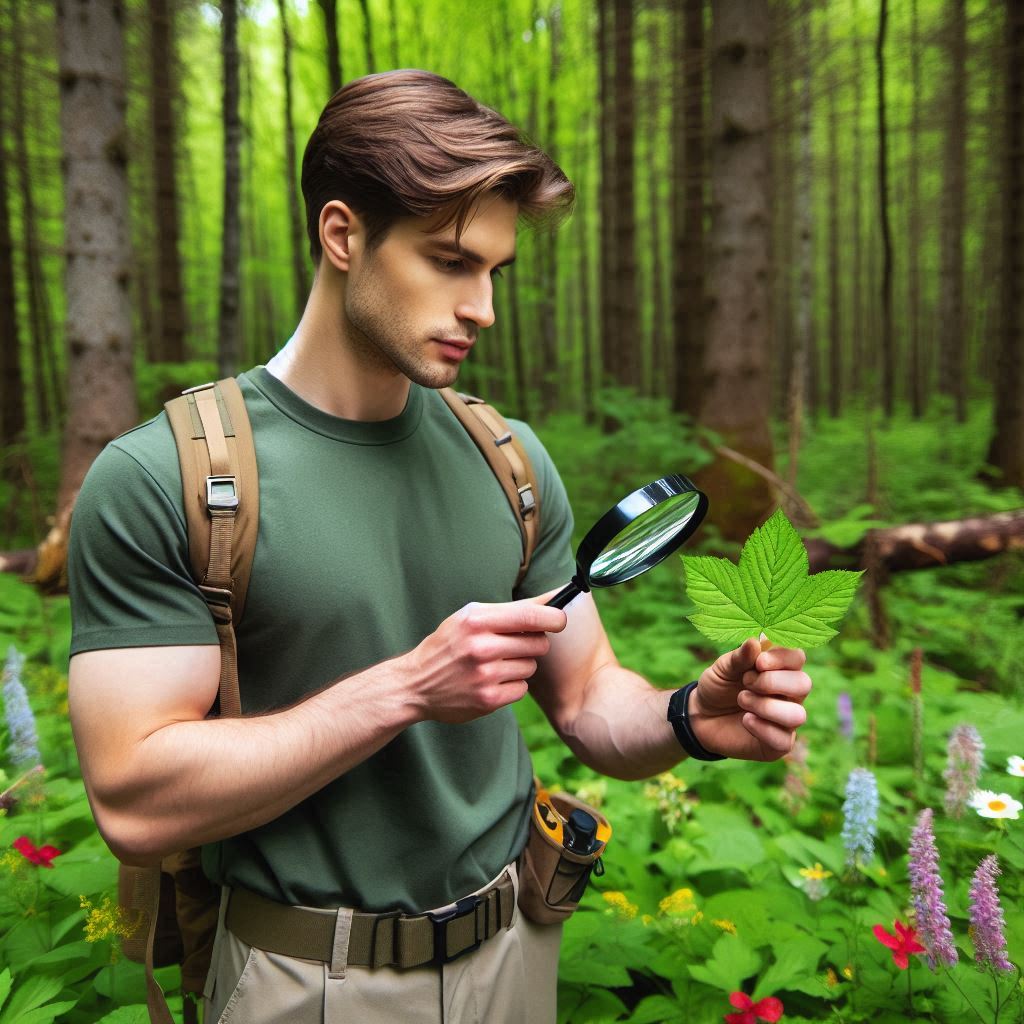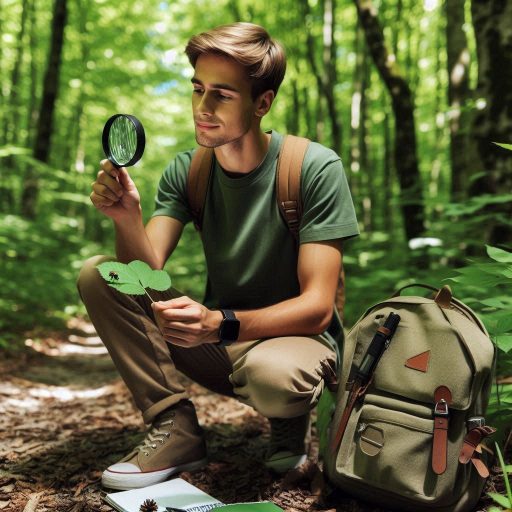Introduction
Field equipment plays a crucial role in the success of aspiring ecologists.
Having the right tools ensures effective research and accurate data collection.
The natural world presents unique challenges, and being prepared is essential for meaningful investigations.
Proper equipment allows ecologists to gather reliable information and draw valid conclusions.
For aspiring ecologists, essential tools range from simple to sophisticated.
Basic items, like notebooks and pencils, help document observations.
However, advanced tools, such as GPS devices and field spectrometers, elevate research capabilities.
With these tools, ecologists can navigate environments efficiently and analyze data on-site.
Field equipment also enhances safety during outdoor activities.
Wearing appropriate gear, such as sturdy boots and weather-resistant clothing, helps prevent injuries.
Additionally, carrying first-aid kits and emergency supplies prepares ecologists for unforeseen challenges.
Safety should always be a priority in the field.
Investing in quality equipment fosters confidence in data collection.
Reliable tools minimize errors and improve the overall research process.
Furthermore, proper equipment helps aspiring ecologists learn essential techniques and methodologies.
As they gain experience, they can refine their skills and expand their knowledge.
In summary, having the right field equipment is vital for aspiring ecologists.
It enhances research quality, ensures safety, and builds a strong foundation for future ecological work.
Essential Tools for Field Observation
As aspiring ecologists, having the right tools is crucial for successful field observations.
These tools help you gather data, identify species, and understand ecosystems better.
Here are three essential items you should always carry in your field kit.
Binoculars for Bird Watching and Wildlife Spotting
Binoculars are a must-have for any ecologist.
They allow you to observe birds and wildlife from a distance without disturbing them.
When selecting binoculars, look for a pair with a magnification of 8x to 10x.
This range provides a good balance between detail and stability.
A wide field of view enhances your ability to track moving animals.
Choose binoculars that are lightweight and waterproof for durability in various weather conditions.
Some models even come with image stabilization features, which can be beneficial in the field.
Practice using your binoculars to improve your skills in spotting wildlife.
The more familiar you are with their use, the better your observations will be.
Hand Lens for Studying Plants and Insects Up Close
A hand lens, or magnifying glass, is another essential tool.
It allows you to examine plants and insects in detail.
When choosing a hand lens, opt for one with a magnification of 10x to 20x.
This magnification is sufficient for observing the fine details of plant structures and insect features.
Hand lenses are especially useful when studying leaves, flowers, or insect anatomy.
They can reveal characteristics that are not visible to the naked eye.
When observing, take your time to focus on the details.
This practice can enhance your understanding of ecological relationships and biodiversity.
Field Notebook and Pens for Recording Observations and Data
A field notebook is crucial for documenting your findings.
It allows you to record observations, sketches, and data in real-time.
Choose a notebook that is durable and water-resistant.
This ensures your notes remain intact in various weather conditions.
Use waterproof pens or pencils to prevent smudging during wet conditions.
Record details such as date, time, location, and weather conditions for each observation.
Note the behaviors and interactions of the species you observe.
These records will help you analyze patterns and trends later.
Keeping accurate notes strengthens your research and supports your conclusions.
In review, these essential tools will significantly enhance your field observation skills as an aspiring ecologist.
Binoculars will help you spot wildlife from a distance, while a hand lens allows for detailed study.
A field notebook captures your observations and insights, ensuring you remember key details.
With these tools, you will be well-equipped for a successful journey into the field.
Always remember that thorough observation is the foundation of ecological study.
Equip yourself well, and enjoy the wonders of nature!
Read: Day in the Life: An Environmental Scientist‘s Typical Day
Navigation and Mapping Tools
Navigating through diverse landscapes is a critical skill for aspiring ecologists.
Proper navigation and mapping tools can enhance your fieldwork experience significantly.
Here are three essential tools: GPS devices or smartphones with GPS capabilities, compasses, and topographic maps.
GPS Device or Smartphone with GPS Capabilities
A GPS device or smartphone with GPS capabilities is invaluable for any aspiring ecologist.
These tools provide accurate location data and help you track your movements in the field.
Most smartphones come equipped with GPS features, making them a convenient choice.
Apps designed for outdoor navigation can offer topographical maps, terrain data, and even trails.
Always ensure your device is fully charged before heading out.
Carry a portable charger for extended fieldwork days.
Relying solely on a smartphone can be risky, especially in remote areas with poor reception.
Consider investing in a dedicated GPS device for added reliability.
Compass for Orienteering and Navigation in Remote Areas
While GPS devices are handy, a compass remains an essential tool for navigation.
Understanding how to use a compass can enhance your orienteering skills.
A compass does not rely on battery power, making it a reliable option.
It can help you maintain your bearings when GPS signals are weak or unavailable.
Practice using a compass in various terrains to build your confidence.
Learn how to take a bearing and follow it to your destination.
A compass can also help you triangulate your position when combined with maps.
Topographic Maps for Understanding the Terrain and Landscape
Topographic maps provide a detailed understanding of the terrain and landscape.
They display elevation changes, water bodies, and vegetation types, offering insights into ecological features.
Knowing how to read a topographic map is crucial for effective navigation.
Familiarize yourself with contour lines, symbols, and scale to interpret these maps accurately.
Carry a physical copy in your field kit, as it can be invaluable when technology fails.
Use topographic maps to plan your route and assess the terrain you will encounter.
Combining these three tools enhances your navigation skills in the field.
Using a GPS device ensures you have reliable location data.
Meanwhile, a compass offers a backup option when electronic devices fail.
Topographic maps provide crucial context about the landscape you‘re exploring.
Together, these tools form a robust navigation system.
As an aspiring ecologist, mastering navigation and mapping tools is essential.
These tools not only help you find your way but also deepen your understanding of the ecosystems you study.
Invest time in learning how to use each tool effectively.
Practice in various environments to build your confidence.
By doing so, you will be better prepared for your fieldwork adventures.
Strong navigation skills can significantly impact your research and conservation efforts in the natural world.
Read: The Impact of Technology on the Chemist Profession in the US
Safety Equipment for Fieldwork
Safety equipment is crucial for aspiring ecologists conducting fieldwork.
It ensures protection against various hazards encountered in natural environments.
A well-stocked first aid kit is a must-have.
This kit should include supplies for treating minor injuries.
Band-aids, antiseptic wipes, and gauze pads are essential items.
Additionally, include adhesive tape, scissors, and tweezers.
Be sure to stock pain relievers like ibuprofen or acetaminophen.
Familiarize yourself with how to use each item effectively.
This knowledge can be invaluable in emergencies.
First Aid Kit for Treating Minor Injuries
A comprehensive first aid kit is vital for any fieldwork expedition.
Include bandages of various sizes to cover different wounds.
Antiseptic wipes will help clean cuts and scrapes.
Gauze pads and adhesive tape can cover larger injuries.
Stock scissors for cutting tape or gauze.
Tweezers are essential for removing splinters or ticks.
Pain relievers like ibuprofen or acetaminophen will alleviate discomfort.
Consider adding a digital thermometer to monitor for fever.
Regularly check your first aid kit and replace expired items.
Familiarizing yourself with the kit‘s contents prepares you for emergencies.
Sun Protection Gear: Hats, Sunglasses, and Sunscreen
Sun protection gear is another vital aspect of fieldwork safety.
Prolonged exposure to sunlight can lead to severe skin damage.
Start with a wide-brimmed hat to shield your face and neck.
Lightweight, breathable clothing with UV protection can offer extra coverage.
Invest in a good pair of sunglasses with UV protection.
They will protect your eyes from harmful rays.
Apply broad-spectrum sunscreen with an SPF of 30 or higher to exposed skin.
Reapply sunscreen every two hours, especially after sweating or swimming.
Protecting your skin from the sun will help you enjoy your fieldwork without unnecessary risks.
Insect Repellent to Ward Off Mosquitoes and Ticks
Insect repellent is essential for warding off mosquitoes and ticks.
These pests can transmit diseases that pose serious health risks.
Choose an insect repellent that contains DEET or picaridin.
Apply it to all exposed skin and clothing for maximum effectiveness.
Follow the product’s instructions for proper application.
Check your body for ticks regularly, especially after walking in tall grass or wooded areas.
If you find a tick, remove it promptly with tweezers.
Grasp the tick as close to the skin’s surface as possible.
Pull upward with steady, even pressure.
Clean the bite area and your hands with rubbing alcohol afterward.
Being prepared for fieldwork means prioritizing safety.
Having a first aid kit, sun protection gear, and insect repellent can make a significant difference.
These items help you address minor injuries and prevent health issues during your research.
They ensure that you focus on your ecological studies without distraction or discomfort.
In fact, aspiring ecologists must prioritize safety equipment when preparing for fieldwork.
A first aid kit can treat minor injuries effectively.
Sun protection gear shields against harmful UV rays.
Insect repellent wards off dangerous pests.
With the right safety equipment, you can conduct your research confidently and enjoyably.
Remember, preparation is the key to a successful field experience.
Stay safe and protect yourself while exploring the great outdoors!
Read: US Chemistry Conferences and Symposiums to Attend in 2024

Sampling and Measurement Tools
For aspiring ecologists, having the right sampling and measurement tools is crucial.
These tools help gather essential data in the field.
They provide insights into soil, water quality, and plant measurements.
Here are three key tools every aspiring ecologist should consider.
Soil Sampling Kit
A soil sampling kit is vital for collecting soil samples.
It typically includes tools like a soil auger, trowel, and containers.
You can use the auger to extract soil cores from various depths.
Each core represents different soil layers, offering insights into nutrient levels and composition.
Always label your samples clearly for accurate analysis later.
You can analyze soil samples in a lab to understand pH, organic matter, and nutrient content.
This information helps assess soil health and its capacity to support plant growth.
It can also inform conservation strategies in various ecosystems.
Water Testing Kit
Awater testing kit is essential for evaluating water quality.
These kits often include test strips or chemical reagents.
You can assess important parameters such as pH, dissolved oxygen, turbidity, and nutrient levels.
To use the kit, collect water samples from streams, lakes, or ponds.
Follow the instructions carefully to ensure accurate results.
Understanding water quality is crucial for assessing the health of aquatic ecosystems.
Regular monitoring helps identify pollution sources and assess the impacts of human activity.
It also aids in the conservation of aquatic habitats and biodiversity.
Measuring Tape
A measuring tape is an indispensable tool for fieldwork.
Use it to take precise measurements of plants and habitats.
Accurate measurements help determine plant height, canopy cover, and spacing between individuals.
You can also use it to map out areas for ecological studies.
Measuring habitats involves assessing dimensions, such as length, width, and area.
This data contributes to understanding the structure and diversity of ecosystems.
It helps identify changes in habitat conditions over time.
With accurate measurements, you can compare different sites and track ecological changes.
Investing in these sampling and measurement tools can significantly enhance your fieldwork as an aspiring ecologist.
A soil sampling kit allows you to analyze soil health effectively.
A water testing kit helps evaluate aquatic ecosystems.
A measuring tape aids in documenting plant growth and habitat changes.
Together, these tools empower you to conduct thorough research and contribute to ecological conservation.
As you gain experience, you will learn to utilize these tools effectively.
Mastering their use will set a solid foundation for your career in ecology.
Embrace these essentials and prepare for a rewarding journey in the field.
Transform Your Career Today
Unlock a personalized career strategy that drives real results. Get tailored advice and a roadmap designed just for you.
Start NowRead: Key Roles and Responsibilities of a Chemist in the US
Explore Further: Interview Tips for Pharmacology Job Seekers
Learn More: Preparing for a Zoologist Job Interview: Tips and Tricks
Equipment for Data Collection
Data collection is a critical aspect of ecological research.
As an aspiring ecologist, equipping yourself with the right tools enhances your ability to gather and analyze information.
Here are three essential pieces of equipment for effective data collection.
Digital Camera
A digital camera is invaluable for capturing images of wildlife, plants, and landscapes.
High-quality photographs can document species presence and habitat conditions.
This visual evidence supports your research findings and enriches your reports.
When selecting a camera, consider features like zoom capability and image resolution.
A camera with a good zoom allows you to photograph distant subjects without disturbing them.
Additionally, choose a model with weatherproof features to withstand various field conditions.
With a digital camera, you can create a comprehensive visual record of your ecological observations.
Audio Recorder
An audio recorder serves as a powerful tool for documenting sounds of nature and animal calls.
Recording environmental sounds provides context for your research.
It allows you to analyze animal behaviors and habitat interactions.
A high-quality audio recorder can capture subtle sounds that the human ear might miss.
Consider selecting a model with noise-canceling features for clear recordings in busy environments.
Ensure the recorder has adequate storage space to capture extended sessions.
This equipment can be particularly useful for studying vocalizations in birds or amphibians.
Including audio recordings in your data collection strengthens your overall research.
Datalogger
A datalogger is essential for monitoring environmental variables like temperature and humidity.
These devices continuously collect data, providing valuable insights into ecological conditions over time.
Use a datalogger to track changes in microclimates or seasonal variations in an ecosystem.
Select a model that suits your specific research needs, considering factors like sensor accuracy and battery life.
Some dataloggers offer remote monitoring capabilities, allowing you to collect data without being physically present.
This feature is especially beneficial for long-term studies.
By incorporating a datalogger into your toolkit, you enhance your ability to analyze trends and patterns in environmental data.
In fact, investing in a digital camera, audio recorder, and datalogger significantly enhances your data collection efforts.
Each piece of equipment plays a unique role in documenting your ecological observations.
These tools allow you to create a more comprehensive picture of the ecosystems you study.
As you embark on your journey as an ecologist, ensure you familiarize yourself with these essentials.
Mastering their use will empower you to conduct meaningful research and contribute valuable insights to the field of ecology.
Camping Gear for Field Trips
Camping gear is essential for aspiring ecologists embarking on field trips.
Proper equipment enhances comfort and safety during overnight stays.
This section highlights three crucial items: a tent and sleeping bag, a portable stove and cookware, and a headlamp or flashlight.
Tent and Sleeping Bag for Overnight Stays in the Field
A tent is vital for overnight stays in the field.
Choose a lightweight and durable tent that is easy to set up.
Look for a tent with good weather resistance to protect against rain and wind.
A two-person tent offers enough space while remaining manageable for transport.
Ensure the tent is well-ventilated to prevent condensation.
Familiarize yourself with the setup process before the trip to avoid hassle in the field.
A quality sleeping bag provides comfort during nighttime rests.
Select a sleeping bag rated for the expected temperature range.
A bag with a synthetic filling is often more affordable and easier to care for than down.
Check for features like draft collars and hoods, which add warmth.
A sleeping pad is also helpful for insulation and comfort.
This pad prevents moisture from the ground from seeping into your sleeping bag.
Consider investing in a compact sleeping bag that compresses well for easy transport.
Portable Stove and Cookware for Preparing Meals
Cooking in the field requires a portable stove and cookware.
A lightweight camp stove allows you to prepare meals easily.
Look for a stove that is fuel-efficient and has adjustable flame controls.
Propane stoves are common and typically easy to use.
Don’t forget to pack fuel canisters for the stove.
A set of lightweight, stackable cookware simplifies cooking and cleaning.
Include a pot, a pan, and utensils like spatulas and tongs.
In addition to cooking gear, bring reusable containers for food storage.
These containers keep leftovers fresh and help minimize waste.
Use a cooler if your trip extends over several days.
Keep food secure from wildlife by using bear-proof containers when necessary.
Always follow Leave No Trace principles to protect the environment.
Headlamp or Flashlight for Navigating in the Dark
A reliable headlamp or flashlight is crucial for navigating in the dark.
Choose a headlamp for hands-free lighting during nighttime tasks.
Ensure it has adjustable brightness settings to conserve battery life.
A flashlight with a sturdy construction is essential for durability.
Pack extra batteries to avoid being left in the dark.
A light with a red filter can help maintain night vision while providing illumination.
Therefore, camping gear significantly impacts the field experience for aspiring ecologists.
A reliable tent and sleeping bag enhance comfort during overnight trips.
Portable stoves and cookware make meal preparation easy.
Headlamps or flashlights ensure safe navigation at night.
Proper gear promotes safety and enjoyment, allowing ecologists to focus on their research and exploration.
Explore Further: Benefits of a Career in Immunology
Conclusion
In the field of ecology, having the right equipment is crucial for success.
Quality tools enhance your research and improve data accuracy.
They allow you to gather information efficiently and safely.
Whether you are studying plant life or animal behavior, the right gear makes a difference.
Investing in quality equipment ensures reliability during your fieldwork.
Durable tools withstand various environmental conditions.
Proper gear can also improve your comfort and safety while working in the field.
From sturdy boots to essential measuring devices, every piece of equipment plays a role in your research outcomes.
As you embark on your journey as an ecologist, prioritize acquiring essential field equipment.
Start with the basics, such as binoculars, field guides, and a durable backpack.
As your skills grow, expand your toolkit with advanced gear tailored to your specific research needs.
Remember, the right equipment not only aids in collecting data but also enriches your field experience.
It enables you to focus on your research rather than worrying about inadequate tools.
Make informed choices and invest in high-quality equipment.
Doing so will enhance your effectiveness as an aspiring ecologist and contribute to meaningful research.
Your success in the field starts with the right tools.




